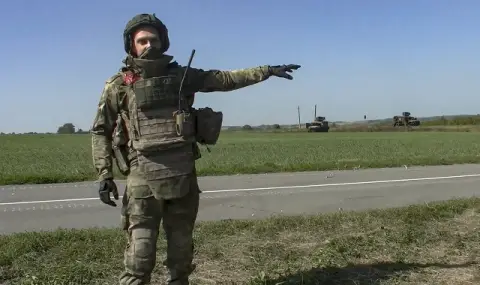Russian forces continue to make significant tactical progress in the western part of Donetsk Oblast, as well as in the eastern parts of Dnipropetrovsk and Zaporozhye Oblasts. Russian elements are reported to be advancing on the outskirts of Velika Novosilka. Several Russian bloggers claimed on November 25 that Russian forces had captured Romanovka (northeast of Ugledar).
This is what the Institute for the Study of War (ISW) writes in another analysis of the fighting in Ukraine, predicting that despite their successes, Russian troops may not achieve their goals in the coming months.
Although ISW has yet to see confirmation of Romanovka, geolocated footage released on November 24 showed two separate Russian mechanized platoon-sized attacks just east of Romanovka near Ilinka and Antonovka, indicating that Russian forces have advanced during these attacks.
Russian bloggers have noted that the Russians in this area are focusing on forcing Ukrainian troops to withdraw west to Constantinople (northwest of Ugledar).
ISW previously assessed on November 24 that the Russian military command has several potential courses of action in this sector of the front.
The recent Russian advance near Velika Novosilka is in line with the November 24 ISW forecast.
The loss of Velika Novosilka would be significant for Ukraine's ability to maintain the defense of the link between Zaporozhye, Donetsk and Dnipropetrovsk oblasts — Ukrainian Volunteer Army spokesman Serhiy Bratchuk noted on November 24 that this was an important logistical point.
A Russian advance into southeastern Dnipropetrovsk Oblast is unlikely in the 2024-2025 winter season. Russian tactical successes in western Donetsk Oblast should not cause undue panic in the short term. Russian forces have not yet resumed operational maneuvers on the battlefield.
Current Russian advances may fall short of their operational objectives, as well as initial Russian frontal attacks on Chasov Yar and Pokrovsk earlier in 2024.
Ukrainian forces hit a Russian oil depot in Kaluga Oblast and an airbase in Kursk Oblast on the night of November 24-25. The Ukrainian General Staff reported that units of the Main Directorate of Military Intelligence of Ukraine (GUR) and the Ukrainian Armed Forces struck several important Russian sites in the Bryansk, Kursk and Kaluga regions.
Russian opposition publication Astra reported that Ukrainian forces fired at least seven ATACMS missiles and 12 drones at the airport, and Russian bloggers acknowledged the strike but said no significant damage was done.
Ukrainian military officials continue to warn of future Russian ground operations against the city of Zaporozhye, although the timing and scale of that offensive remain unclear due to operational constraints imposed by ongoing Russian operations in Kursk and Donetsk Oblasts. The Economist, citing Ukrainian intelligence sources, reported on November 24 that Russian forces were training up to 130,000 personnel, although the date was unknown.
Military command sources previously said that the Ukrainian incursion into Kursk Oblast has prevented Russian forces from launching a major offensive operation in Zaporozhye Oblast in recent months - in line with statements by the Ukrainian battalion commander.
ISW has previously observed reports that the Russian military command has redeployed forces from the western Zaporozhye region to respond to the Kursk invasion in August 2024
The spokesman for the Ukrainian Tavri Group, Colonel Vladyslav Voloshin, warned on November 11 that Russian forces were moving trained assault groups to forward positions in the occupied Zaporozhye region.
Voloshin later noted on November 24 that Russian forces had not moved large groups of forces in the direction of Zaporozhye, but rather were moving small units of assault personnel or drone operators from Donetsk Oblast to bolster Russian attacks on south.
Ukrainian Volunteer Army spokesman Serhiy Bratchuk played down reports of a possible Russian ground offensive against the city of Zaporozhye, but noted that the constant threat of Russian airstrikes on the southern front line is aimed at instilling fear among Ukrainian civilians.
Bratchuk responded to concerns about Russian preparations in the area by revealing that Ukrainian forces have seen a transfer of Russian units from the direction of Zaporozhye to the Kurakhove-Pokrovsk line in the Donetsk region for continued offensive operations.
ISW is unable to independently confirm large-scale redeployment of Russian troops at this time.
North Korea is reportedly expanding a key weapons plant that is likely being used to supply Russia with ballistic missiles. This was reported by "Reuters", referring to satellite images from a US-based think tank.
CNN reported on Nov. 23 that about 60 of the 194 ballistic missiles Russia has fired at Ukraine so far in 2024 were delivered by North Korea.
ISW continues to monitor increased support to the DPRK through the deployment of troops and the provision of ammunition and weapons.
The Kremlin has signaled it will remove the Taliban from its list of banned organizations, amid increased rapprochement with them. Afghan and Russian media reported on November 25 that the Secretary General of the Russian Security Council, Sergei Shoigu, made the promise during a meeting with the Deputy Prime Minister of the Islamic Emirate of Afghanistan and a Taliban delegation.
ISW has previously noted that the Kremlin has been in direct contact with the Taliban since they took power in Afghanistan in 2021, although stronger Russian recognition as the legitimate Afghan government is likely to increase their cooperation.
